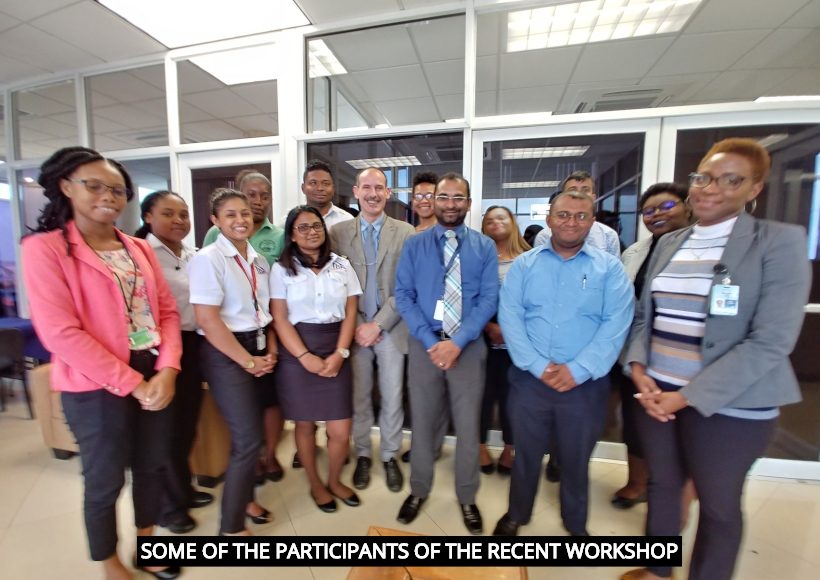The Guyana Civil Aviation Authority (GCAA) has begun preparatory works for the implementation of the pilot phase of the Carbon Offsetting and Reduction Scheme for International Aviation (CORSIA), by hosting a two-day capacity building workshop for the aviation industry.
The workshop spanned the period April 15 to 16, 2019, at the Authority’s Head Office. Speaking at the opening, Director General of the GCAA, Lt. Col. (Ret’d) Egbert Field, said that Guyana has made a bold step by participating in the programme.
“You are a part of what is considered an important occasion, where Guyana is among the many countries that will be able to share their experiences from this programme and help shape the future of aviation globally” Col. Field said.
He encouraged the participants to share the knowledge gained from the workshop to their colleagues at their various agencies. He also reminded the participants that the initiative is aligned with the Government’s Green State Development Strategy, contributing to Guyana’s national goals and the International Civil Aviation Organisation (ICAO) goals simultaneously.
Director of Air Transport and Economic Regulations at the GCAA, Mr. Saheed Sulaman, noted that Guyana is among the first set of countries to have develop regulations for the CORSIA programme. Reflecting briefly, Mr. Sulaman said the GCAA reached out to ICAO in March 2019, indicating an interest in capacity building.
ICAO, in turn, facilitated Guyana’s request and provided capacity building assistance from Italy in the CORSIA Buddy Partnership programme. ICAO provided a technical environment expert and consultant, Mr. Caesar Velarde, who facilitated the training, as part of ICAO’s Assistance, Capacity building and Training for CORSIA (ACT-CORSIA) programme.
The training was centered on providing information on how to establish a Monitoring, Reporting and Verification (MRV) system to monitor the level of CO2 emissions from our international aviation operations and report same to ICAO to create the baseline in the years 2019 and 2020.
CORSIA is a market-based measure (MBM) adopted by ICAO as part of a broad set of measures to help ICAO decrease the carbon footprint of international civil aviation.
A market-based measure (MBM) is a policy tool that is designed to achieve environmental goals at a lower cost and in a more flexible manner than traditional regulatory measures. Examples of MBMs include levies, emissions trading systems, and carbon offsetting. CORSIA will take the form of carbon offsetting.
CORSIA will have three implementation phases: the Pilot Phase from 2021-2023, the First Phase from 2024-2026, and the Second Phase from 2027-2035. Participating in CORSIA’s Pilot Phase will catapult Guyana’s aviation industry directly to the forefront of the fight against climate change.
As a voluntary State, Guyana will also have the opportunity to share the experiences of developing States in implementing CORSIA.
Airlines engaged in international operations will develop and furnish an Emissions Monitoring Plan to the State for approval. After approval, the operator will be required to monitor their emissions throughout the year in accordance with the plan. Their subsequent report to the State will be in the form of an Annual Emissions Report. Guyana will be required to provide a summarised State Report on total emissions to ICAO.
Agencies that benefited from the training include the Environmental Protection Agency, the Office for Climate Change, the Cheddi Jagan International Airport, the Caribbean Safety and Security Oversight System (CASSOS) and domestic airline operators.













